SIBBM 2024 • Frontiers in Molecular Biology
SIBBM 2024 • Frontiers in Molecular Biology
The time of Molecular Biology:
development, homeostasis and aging
The time of Molecular Biology:
development, homeostasis and aging
Trento, Italy • 17-19 June 2024
Trento, Italy • 17-19 June 2024
SIBBM 2024 • Frontiers in Molecular Biology
The time of Molecular Biology:
development, homeostasis and aging
Trento, Italy • 17-19 June 2024
Charting new paths: EC-SIBBM pre-meeting on building sustainable research careers
Charting new paths: EC-SIBBM pre-meeting on building sustainable research careers
Charting new paths: EC-SIBBM pre-meeting on building sustainable research careers
Dear Colleagues,
We are thrilled to invite you to the upcoming Early Career SIBBM (EC-SIBBM) pre-meeting scheduled for June 16-17 in Trento, Italy.
EC-SIBBM aims to bring together early-career investigators, providing a supportive environment for the progression of their scientific journeys.
The goal is to foster communication and networking skills within the scientific community while offering a friendly and stimulating platform for participants to showcase their research. EC-SIBBM will serve as a springboard for discussions on growth opportunities and provide guidance for navigating academic or industry research career paths.
Key Information:

by Edoardo Sozzi
Alessandro Fiorenzano
IGB-CNR,Naples
Michela A. Denti
University of Trento
Simone Detassis
OPTOI Srl
Elisa Facen
University of Trento
Giorgia Susin
University of Trento
Elisabetta Visentin
University of Trento
Sunday, 16 June |
|
|---|---|
| 9:00-9:20 | Opening |
| Session I – Experimenting with Your Career: Academia, Industry, Startups, Core Facilities... | |
| 9:20-9:40 |
Giorgia Foggetti (Università Vita-Salute San Raffaele, Milan) Tackling Problems (in Lab and Life) to Unveil Novel Therapeutic Targets in Lung Adenocarcinoma |
| 9:40-10:00 |
Daniela Di Girolamo (University Federico II, Naples) Make it work!...from lab experiments to career development |
| 10:00-10:20 |
Irene Faravelli (Harvard University, Cambridge, MA, USA) Exploring the brain through a journey from bench to bedside and back |
| 10:20-11:00 | Coffee break |
| 11:00-11:20 |
Massimiliano Clamer (Immagina Biotech, Trento) Looking for happiness, always striving to connect and grow |
| 11:20-11:40 |
Antonio Casini (Alia Therapeutics, Trento) How I gave a twist to my Ph.D. and founded a startup: an example of successful technology transfer |
| 11:40-12:10 |
Valentina Adami (CIBIO Facilities, University of Trento) and Veronica De Sanctis (CIBIO Facilities, University of Trento) Research Core Facilities: we rise by lifting others |
| 12:10-12:45 | Round Table |
| 12:45-14:00 | Lunch |
| Session II – Enhancing Awareness of Oral Presentations | |
| 14:00-14:40 |
Marzia Munafò (EMBL, Rome) Draw your science |
| 14:40-15:40 | Andrea Brunello (playwright, actor, artistic director of the company Arditodesìo) |
| 15:40-18:40 | Science... what a story! |
| 18:40 | Enjoy Trento & dinner |
Monday, 17 June |
|
|---|---|
| Session III – DataBlitz | |
| 9:00-10:15 |
1st DataBlitz Chairs: Irene Faravelli, Daniela Di Girolamo, Elisa Facen 1. Davide Benvegnu Metabolic switch in early mouse embryonic development: insights from a 3D in vitro model 2. Livia Condemi Exploring the role of PRC2 recruitment proteins in embryonic stem cells differentiation 3. Silvia Gasparini Exploring the expression and functional role of circRmst in neuronal differentiation 4. Elisa Ferracci Unbalancing Polycomb group of proteins activities during liver regeneration 5. Davide Capuano Site-directed RNA editing for correcting point mutations causing fALS 6. Petronilla Frugis Harnessing endogenous ADARs for correcting a pathogenic G>A point mutation in SBF1 7. Nicole Bettin Telomeric TERRA transcripts regulate telomerase access to chromosome ends 8. Meriem Hamadou Tweaking the Transcript: Unveiling Hidden Regulators of Protein Production |
| 10:15-10:45 | Coffee break |
| 10:45-12:00 |
2nd DataBlitz Chairs: Marzia Munafò, Giorgia Susin, Simone Detassis 1. Domenico Liguoro Self-assembling nanoparticles for miRNA delivery towards precision medicine against melanoma 2. Chiara Carrino Integrating transcriptomic and phosphoproteomic data to discover dysregulated transcriptional networks in lung cancer 3. Camilla Vitali Genome-scale dependency maps reveal hints about the function and therapeutic value of an oncogenic transcription factor in human cancer 4. Andrea Lobascio Unraveling the contribution of cancer-associated fibroblasts to drug resistance in breast cancer 5. Daniele Viavattene Guilty by association: the tale of mTOR and STAT3 at the ER 6. Mariaceleste Pezzullo A novel competing endogenous RNA network involving the lncRNA JPX, miR-378a-3p and its mRNA targets in lung adenocarcinoma 7. Jahnavi Srivatsa TFDP1 and E2F3 transcription factors identified as regulators of aggressiveness in basal-like breast cancer by gene co-expression network analysis 8. Christian Ramirez METTL3 inhibition modulates RNA structure, A-to-I editing and immune response in leukemia models |
| 12:30 | Closing & Remarks |
| Light lunch and SIBBM Annual Conference registration | |
 Valentina Adami has been the coordinator of the Core Facilities at CIBIO, the Department of Cellular, Computational and Integrative Biology (University of Trento) since 2014.
She obtained a degree in pharmaceutical chemistry (University of Trieste) and a specialization in hospital pharmacy (University of Padova).
Valentina Adami has been the coordinator of the Core Facilities at CIBIO, the Department of Cellular, Computational and Integrative Biology (University of Trento) since 2014.
She obtained a degree in pharmaceutical chemistry (University of Trieste) and a specialization in hospital pharmacy (University of Padova).
She has worked for ten years in start-up and spin-off companies of the University of Udine in the field of stem cells for advanced cell therapies.
She moved to the University of Trento in 2009, where she set up the High Throughput Screening (HTS) core facility, aiming to provide expertise and support in HTS workflows, from experimental design to assay optimization and analysis.
She has more than ten years of experience in the organization, implementation and management of core facilities and training activities at the National and International levels.
She is actively involved in the international network CTLS (Core Technology for the Life Science). She has lead the Training working group of the association from 2016 to 2021 and has been part of the Board of Directors since 2022.
Her passion for networking led to the creation of the Italian network of core facilities (NICo), in 2022.
She is WP leader and participant in several European projects for Research Infrastructures and Core Facilities (InnoCore, RITrain+, BBMRI.it NRRP).
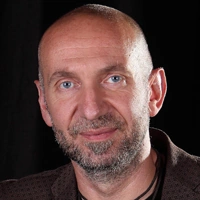 Researcher, playwright, director, actor, teacher, science communicator and podcaster, Andrea Brunello works at the boundary between theatre and science. He is a graduate of the three year program “SAT - SCHOOL AFTER THEATRE advanced training program” led by the Russian director and pedagogue Jurij Alschitz and affiliated with the EATC/Russian Academy of Theatre Arts (GITIS) of Moscow (Russia). On the scientific side, Andrea holds a Bachelor’s degree in physics and mathematics from Cornell University and a Ph.D. in Physics from Stony Brook University (New York). He is also a graduate of the University of Trento (Italy) Master in Communication of Science and Innovation (SCICOMM).
Researcher, playwright, director, actor, teacher, science communicator and podcaster, Andrea Brunello works at the boundary between theatre and science. He is a graduate of the three year program “SAT - SCHOOL AFTER THEATRE advanced training program” led by the Russian director and pedagogue Jurij Alschitz and affiliated with the EATC/Russian Academy of Theatre Arts (GITIS) of Moscow (Russia). On the scientific side, Andrea holds a Bachelor’s degree in physics and mathematics from Cornell University and a Ph.D. in Physics from Stony Brook University (New York). He is also a graduate of the University of Trento (Italy) Master in Communication of Science and Innovation (SCICOMM).
Andrea teaches science storytelling theory and practice at the Master in Communication of Science and Innovation and at the Physics Department of the University of Trento (Italy). He also teaches soft skills science storytelling at the Physics and Astronomy Department of the University of Bologna.
He is the founder and director of the Portland Theatre of Trento and of the Arditodesìo Company. Since 2012 he curates the Jet Propulsion Theatre Project which aims to connect theatre with science and, starting in 2017 he is the artistic director of Teatro della Meraviglia, a science theatre festival held annually in Trento.
Andrea is member of the scientific committee of “Theatre about Science - International Conference” (Coimbra, Portugal) and of the board of directors of EUSEA - the European Science Engagement Association.
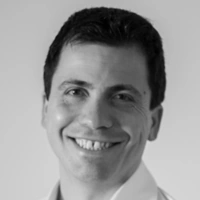 Dr. Massimiliano Clamer, a biomolecular scientist with a pharmaceutical background obtained at the University of Padua (Italy) and Bonn (Germany), is passionate about translating cutting-edge research into tangible solutions. His PhD work was a unique collaboration between the University of Trento (Italy) and the University of Oxford (UK), focused on the intriguing field of host-pathogen interaction and single-molecule RNA sensing. During is work in Oxford, he broadened his horizons by taking courses at the Saïd Business School.
Dr. Massimiliano Clamer, a biomolecular scientist with a pharmaceutical background obtained at the University of Padua (Italy) and Bonn (Germany), is passionate about translating cutting-edge research into tangible solutions. His PhD work was a unique collaboration between the University of Trento (Italy) and the University of Oxford (UK), focused on the intriguing field of host-pathogen interaction and single-molecule RNA sensing. During is work in Oxford, he broadened his horizons by taking courses at the Saïd Business School.
Back in Italy, he worked across three research labs, the Institute of Biophysics (CNR), the University of Trento, and the Bruno Kessler Foundation, to validate promising business ideas. This well-rounded academic experience fueled in 2014 the creation of Immagina Biotechnology s.r.l., a company he is now leading as CEO. In 2023, Immagina became part of the Technicon Spa holding, solidifying its position within the bio-business sector. A strong believer in collaboration, Dr. Clamer fosters close working relationships with his team, advisors, and investors. This allows him to bridge the gap between academia and the commercial world, continuously leveraging his growing expertise to drive innovation into this exciting field. Beyond science, Dr. Clamer enjoys family, books, and an active lifestyle, including activities like hiking, running, skiing, fishing, and football.
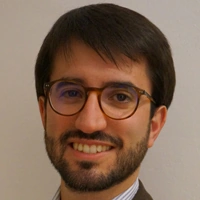 Antonio is currently the Chief Technology Officier of Alia Therapeutics, the first Italian genome editing company. He studied Biology at the Scuola Normale Superiore in Pisa and obtained his PhD in Biomolecular Sciences at the University of Trento. His research focuses on the development of CRISPR tools for their application in gene therapy. He is author of publications on CRISPR-based genome editing in high impact journals, among which Nature Biotechnology and Nature Communications. He is also inventor of various patents related to genome editing technologies. Antonio is among the founders of Alia Therapeutics, which was launched to exploit CRISPR technologies he helped to co-develop and bring them to the clinic.
Antonio is currently the Chief Technology Officier of Alia Therapeutics, the first Italian genome editing company. He studied Biology at the Scuola Normale Superiore in Pisa and obtained his PhD in Biomolecular Sciences at the University of Trento. His research focuses on the development of CRISPR tools for their application in gene therapy. He is author of publications on CRISPR-based genome editing in high impact journals, among which Nature Biotechnology and Nature Communications. He is also inventor of various patents related to genome editing technologies. Antonio is among the founders of Alia Therapeutics, which was launched to exploit CRISPR technologies he helped to co-develop and bring them to the clinic.
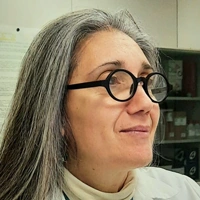 Veronica De Sanctis received her PhD in Genetics e Molecular Biology from the University of Rome. Later, working as a postdoc in the Laboratory of Functional Genomics and Proteomics in Rome, in California at UCLA with Prof Michael Grunstein, and at CIBIO, University of Trento, she applied microarrays and next generation sequencing technologies to functional genomics, leading, or cooperating on several projects.
Veronica De Sanctis received her PhD in Genetics e Molecular Biology from the University of Rome. Later, working as a postdoc in the Laboratory of Functional Genomics and Proteomics in Rome, in California at UCLA with Prof Michael Grunstein, and at CIBIO, University of Trento, she applied microarrays and next generation sequencing technologies to functional genomics, leading, or cooperating on several projects.
Her scientific interests spanned from histone post-transcriptional modifications and their role in DNA replication, to transcription regulation mediated by the interplay between transcription factors and chromatin structure, always with a strong enthusiasm for any technological advancement.
In 2010 she transitioned from being a postdoc to running a core facility and she had to face a crucial change in her life since she adopted a completely diverse approach to research and science. In the last 14 years, she has been managing the NGS facility in the University of Trento dealing with all common sequencing applications and developing/implementing novel library preparation methods for CIBIO and external researchers.
In this role, she got actively involved in ensuring visibility, recognition and career development for technicians working in higher education and research.
She is co-chair of the Training working group of CTLS (Core Technology for the Life Science) and coordinator of the career development working group of the Italian network of core facilities (NICo).
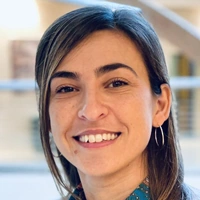 Targeted therapies based on oncogenic driver alterations have improved the survival of patients with cancer. However, heterogeneity of drug responses and emergence of resistance remain critical challenges in the field. Thus, there is a critical need to study the biology of these tumors to define better treatment strategies for subgroups of patients who do not benefit from standard therapy. My Laboratory mainly focuses on understanding the mechanisms that modulate therapeutic response and resistance in EGFR mutant lung adenocarcinoma. The goal of our research is to generate patient-derived models of lung adenocarcinoma to identify subsets of tumors that may need additional interventions. My team and I combine these unique systems with an innovative mouse model of EGFR mutant lung adenocarcinoma that enables to investigate the molecular and cellular changes that underlie cancer initiation, progression, and drug response within the tumor microenvironment. By correlating our findings with clinical data, we aim to uncover potential biomarkers of reduced therapeutic sensitivity to develop new strategies. Our close interaction with our clinical colleagues creates the potential for our findings to ultimately inform clinical trials towards a personalized medicine for patients with lung cancer.
Targeted therapies based on oncogenic driver alterations have improved the survival of patients with cancer. However, heterogeneity of drug responses and emergence of resistance remain critical challenges in the field. Thus, there is a critical need to study the biology of these tumors to define better treatment strategies for subgroups of patients who do not benefit from standard therapy. My Laboratory mainly focuses on understanding the mechanisms that modulate therapeutic response and resistance in EGFR mutant lung adenocarcinoma. The goal of our research is to generate patient-derived models of lung adenocarcinoma to identify subsets of tumors that may need additional interventions. My team and I combine these unique systems with an innovative mouse model of EGFR mutant lung adenocarcinoma that enables to investigate the molecular and cellular changes that underlie cancer initiation, progression, and drug response within the tumor microenvironment. By correlating our findings with clinical data, we aim to uncover potential biomarkers of reduced therapeutic sensitivity to develop new strategies. Our close interaction with our clinical colleagues creates the potential for our findings to ultimately inform clinical trials towards a personalized medicine for patients with lung cancer.
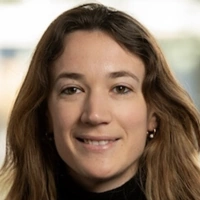 After earning my medical degree in 2013, I joined the Neurology residency program at the University of Milan, specializing in treating patients with neurological conditions while conducting research on motor neuron diseases. At the IRCCS Fondazione Ca’ Granda Ospedale Maggiore Policlinico, I worked on utilizing 3D spinal organoids derived from stem cells to elucidate neuromuscular disease mechanisms.
After earning my medical degree in 2013, I joined the Neurology residency program at the University of Milan, specializing in treating patients with neurological conditions while conducting research on motor neuron diseases. At the IRCCS Fondazione Ca’ Granda Ospedale Maggiore Policlinico, I worked on utilizing 3D spinal organoids derived from stem cells to elucidate neuromuscular disease mechanisms.
In 2017, I was visiting postdoctoral fellow at Columbia University in New York, investigating the role of the SMN complex in spinal muscular atrophy using preclinical models. Our findings highlighted the crucial influence of post-translational modifications in determining disease phenotypes.
In 2021, I joined the Arlotta Lab at Harvard University and assumed a position as a postdoctoral research fellow at the Stanley Center for Psychiatric Research at the Broad Institute of MIT and Harvard. Here, my research efforts focused on investigating the neurobiology of development and neurodevelopmental disorders through the utilization of brain organoids. I pioneered the development of a novel 3D human in vitro platform, aimed at probing the variability in response to different neurotoxins and therapeutics. Additionally, I worked on generating more complex brain organoid models, recapitulating the diverse cell types expected during development.
My research aims at bridging the gap between clinical neurology and neuroscience, which could pave the way for fundamental discoveries and advanced patient care.
 After graduating in biology in 2012, I joined the PhD program in biology at the University of Naples Federico II in 2014, where I had the opportunity to learn more about skin and skin stem cells and how their behavior can be modified by local control of hormones in both physiological and pathological conditions.
After graduating in biology in 2012, I joined the PhD program in biology at the University of Naples Federico II in 2014, where I had the opportunity to learn more about skin and skin stem cells and how their behavior can be modified by local control of hormones in both physiological and pathological conditions.
In 2018, thanks to an ARC postdoctoral fellowship, I joined the laboratory of Shahragim Tajbakhsh at the Institut Pasteur in Paris, where I elucidated how high-performance muscle stem cells (MuSCs) regulate myogenic commitment by remodeling their local environment and adopting properties not generally associated with myogenic cells. We also focused on cellular quiescence, which is adopted in different forms by unicellular to multicellular organisms. This cell state is associated with low metabolic activity, reduced transcription, translation and cytoplasmic volume, leading to the idea that it is a protective cell state. However, in multicellular organisms, it is unclear to what extent exposure to pathologies distal to quiescent resident tissue stem cells affects their properties and function. We have therefore sought to fill this knowledge gap.
From 2021, I became RTDA at the University of Naples Federico II where I focused my research on skin basal/progenitor cells where the transcription factor p63 is expressed. In particular, my project aims to develop therapeutic strategies focused at resolving long-lasting skin erosions in AEC syndrome, a severe genetic disorder characterized by congenital erythroderma and severe skin erosions that negatively affect patients' quality of life and caused by mutation in the epidermis master regulator gene p63.
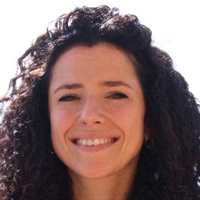 I am a molecular biologist by training, with a keen interest in RNA biology, early embryonic development and epigenetics. I earned my Master's degree from Sapienza University in 2015 and then worked as a Research assistant at Harvard Medical School (USA) in the Gregory lab, where I focused on RNA decay mechanisms in stem cells. In 2016, I joined the Hannon lab at the University of Cambridge (UK) for my PhD, where I studied the molecular mechanisms of small RNA-mediated transposon regulation in Drosophila. During my PhD I also started exploring illustration as a means of science communication and I am currently combining my scientific education with my passion for drawing in the creation of unconventional scientific illustration. Since 2020, I am a postdoctoral fellow in the Hackett group at the European Molecular Biology Lab (EMBL) in Rome, where I study maternal epigenetic inheritance.
I am a molecular biologist by training, with a keen interest in RNA biology, early embryonic development and epigenetics. I earned my Master's degree from Sapienza University in 2015 and then worked as a Research assistant at Harvard Medical School (USA) in the Gregory lab, where I focused on RNA decay mechanisms in stem cells. In 2016, I joined the Hannon lab at the University of Cambridge (UK) for my PhD, where I studied the molecular mechanisms of small RNA-mediated transposon regulation in Drosophila. During my PhD I also started exploring illustration as a means of science communication and I am currently combining my scientific education with my passion for drawing in the creation of unconventional scientific illustration. Since 2020, I am a postdoctoral fellow in the Hackett group at the European Molecular Biology Lab (EMBL) in Rome, where I study maternal epigenetic inheritance.